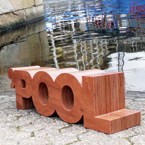Jointly organized by Japan Center, Institute for Cultural and Social Anthropology and Institute for European Ethnology, and Seminar of Economic History of Ludwig Maximilians University Munich, and Urban Research Plaza of Osaka City University
supported by
The Japan Foundation, Osaka City University, State Ministry for Social Affairs of Bavaria, Münchener Universitätsgesellschaft
The conference Creating Cities: Culture, Space and Sustainability, which will take place from 25 to 27 February 2010, investigates the forces that shape the conditions of urban development and the creation of cities in comparative and interdisciplinary perspective. In recent years, the notion of the „creative city“ has become a guiding framework for thinking about the present and future state of cities and their capability of coping with the impact and challenges of globalization. Cities are regarded as engines of regional, national, and global economic growth because they are the key centers for cultural production and consumption and target areas for mobility and migration. They are also contested sites because of increasing cultural and social diversity. Simultaneously, cities use cultural diversity and even counter-cultures to display appealing images and representations of creativity and innovation. Many citizens aspire to live and work in the cosmopolitan global environments that only metropolitan centers seem to be able to provide, but cities also provide vital space for the challenged, homeless, and other socially disadvantaged groups. The resolution of social disparities is consequently becoming an urgent policy task. Environmental and social sustainability, urban revitalization and amenity are major keywords of our time.
In this context, this conference focuses on the interactions among culture, sustainability, and space. We would like to emphasize inquiry into the dynamics of cultural creativity, industries and production, the risks and benefits of both cultural diversity and social inclusion or exclusion, the sustainability of efforts to plan and redesign the urban built environment to promote creativity, and the identity politics of representations of the city and creativity in the popular imagination as well as spaces of heritage and tourism. We recognize that there are many different groups and focal points related to creating cities, so one major purpose of this conference is to create a framework in which both practitioners and researchers of different disciplines can interact and share ideas about how urban environments are being transformed.
Introductory Session: Creating Cities & Creative Cities
As global market forces penetrate hitherto closed rural areas wherever market liberalization occurs, urbanization, too, is progressing rapidly. Even though regional differences obviously do exist the global ratio of urban population has now crossed the 50-percent line. While mega cities may be one of the most conspicuous phenomena of the present urbanization the term urban must be understood in a much broader sense. The fact that the majority of urban dwellers still lives in smaller and medium-sized settlements is frequently overlooked. Only through a combined effort of local supplier development, national institutional support, and foreign investment can there be any real benefits from for example creative cluster development and economies of scale and scope. Two prominent regions of Southeast Asia, namely the Greater Mekong Region and Singapore, will serve as examples as this session will investigate the relationship between the process of creating cities and the making of creative cities.
Session 1: Creative Diversity, Socioscapes, and Cultural Politics
This session critically reviews current notions and implications of cultural diversity in cities by bringing together broadly three strands: representation, socioscapes, and cultural politics. The interplay between creating particular urban images and the urban condition of particular socioscapes, ranging from less empowered groups such as those that are affected by transnational precarization to elite diasporas, will be examined.
Session 2: City Marketing
Cities are increasingly undertaking marketing activities to support their local economy. By way of example, this section will look at how city marketing may cope with challenges in terms of communication content, tools or media, and with regard to underlying organizational structures and processes.
Session 3: Mobility and Built Environment
Mobility is a crucial aspect of globalization and the development of more efficient mobility systems on a grand scale is a significant locus for planning activity in global cities. This session will compare and contrast corporate and planning approaches to mobility issues in several global cities.
Session 4: Networks
Global cities rely upon networks with other cities, and the institutions, infrastructure, character, extent and effects of such inter-city networking are the subject for this session. It will identify the possibilities and constraints on such network development.
See also the detailed conference program (as of 2010-01-14, pdf format, 600 KB).
Please note:
- The conference will take place at the IBZ Munich, Amalienstraße 38, D-80799 Munich / Germany (how to get there).
- Admission fee (regular/student) will be EUR 40/20 for the whole conference, or EUR 20/10 for participation on Thursday and EUR 10/5 for participation on Friday or Saturday, respectively.
- If you would like to attend the conference, please register until February 15th, 2010 viaÂ
 E-Mail(Subject: Registration Creating Cities)
E-Mail(Subject: Registration Creating Cities)
- Please also consult our list of accomodations near the conference site.
- For the duration of the symposium (25-27 February) our invited guests will be staying at the Savoy Hotel Munich at Amalienstrasse 25 (Tel. +49 (0) 89 / 287870 - how to get there). At the hotel, they will receive the conference folder, containing also a map with the symposium venue indicated. The symposium venue is literally just down the street, at Amalienstrasse 38, i.e. in easy walking distance (cf. the Google Maps location of the hotel).
Prof. Dr. Evelyn Schulz
LMU Japan Center
phone: +49 89 / 2180-9800
fax: +49 89 / 2180-9801
For further inquiries, please  E-Mail us.
E-Mail us.
via Veranstaltungen – Ludwig-Maximilians-Universität München.


